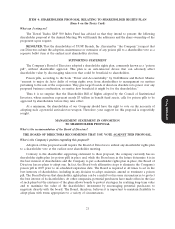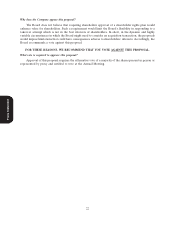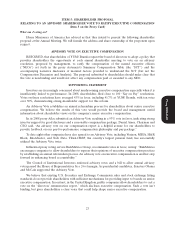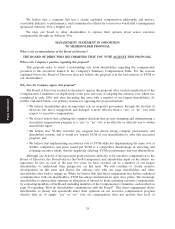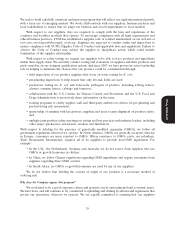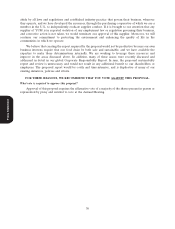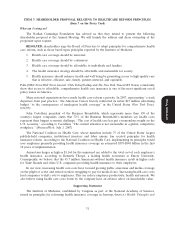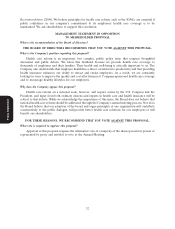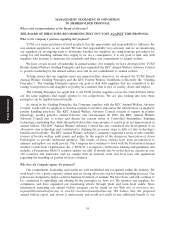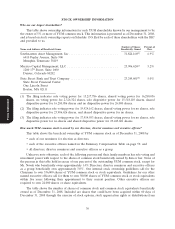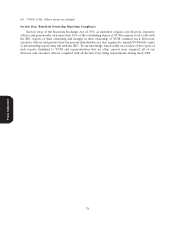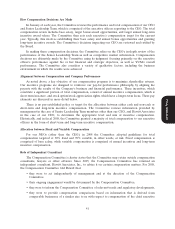Pizza Hut 2008 Annual Report Download - page 49
Download and view the complete annual report
Please find page 49 of the 2008 Pizza Hut annual report below. You can navigate through the pages in the report by either clicking on the pages listed below, or by using the keyword search tool below to find specific information within the annual report.
23MAR200920295069
ITEM 7: SHAREHOLDER PROPOSAL RELATING TO HEALTHCARE REFORM PRINCIPLES
(Item 7 on the Proxy Card)
What am I voting on?
The Nathan Cummings Foundation has advised us that they intend to present the following
shareholder proposal at the Annual Meeting. We will furnish the address and share ownership of the
proponent upon request.
RESOLVED: shareholders urge the Board of Directors to adopt principles for comprehensive health
care reform, such as those based upon principles reported by the Institute of Medicine:
1. Health care coverage should be universal.
2. Health care coverage should be continuous.
3. Health care coverage should be affordable to individuals and families.
4. The health insurance strategy should be affordable and sustainable for society.
5. Health insurance should enhance health and well being by promoting access to high-quality care
that is effective, efficient, safe, timely, patient-centered, and equitable.
Polls (NBC News/Wall Street Journal, USA Today/Gallup and The New York Times/CBS News) consistently
show that access to affordable, comprehensive health care insurance is one of the most significant social
policy issues in America.
Many national organizations have made health care reform a priority. In 2007, representing ‘‘a stark
departure from past practice,’’ the American Cancer Society redirected its entire $15 million advertising
budget ‘‘to the consequences of inadequate health coverage’’ in the United States (New York Times,
8/31/07).
John Castellani, president of the Business Roundtable, which represents more than 150 of the
country’s largest companies, states that 52% of the Business Roundtable’s members say health costs
represent their biggest economic challenge. ‘‘The cost of health care has put a tremendous weight on the
Proxy Statement
U.S. economy,’’ according to Castellani, ‘‘The current situation is not sustainable in a global, competitive
workplace.’’ (BusinessWeek, July 3, 2007)
The National Coalition on Health Care, whose members include 75 of the United States’ largest
publicly-held companies, institutional investors and labor unions, has created principles for health
insurance reform. According to the National Coalition on Health Care, implementing its principles would
save employers presently providing health insurance coverage an estimated $595-$848 billion in the first
10 years of implementation.
Annual surcharges as high as $1,160 for the uninsured are added to the total cost of each employee’s
health insurance, according to Kenneth Thorpe, a leading health economist at Emory University.
Consequently, we believe that the 45.7 million Americans without health insurance result in higher costs
for Yum! Brands and other U.S. companies providing health insurance to their employees.
In our view, increasing health care costs have focused growing public awareness and media coverage
on the plight of active and retired workers struggling to pay for medical care. Increasing health care costs
lead companies to shift costs to employees. This can reduce employee productivity, health and morale. We
also believe rising health care costs borne by the company have an adverse affect on shareholder value.
Supporting Statement
The Institute of Medicine, established by Congress as part of the National Academy of Sciences,
issued its principles for reforming health insurance coverage in Insuring America’s Health: Principles and
31


